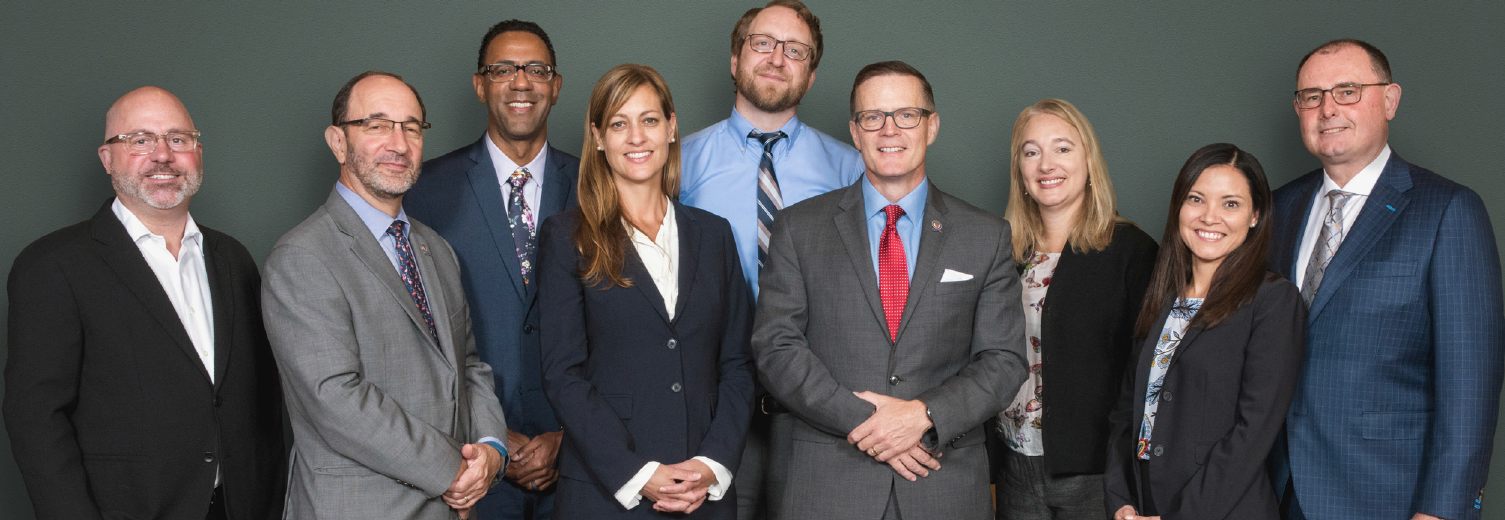We're Working Together to Extend Justice
(from left) Ian Friedman, Esq. - Cleveland Metropolitan Bar Association | Councilman Tony Brancatelli | Ken Surratt - Cuyahoga County | Abigail Staudt, Esq. - Legal Aid | Steven Rys - Cleveland City Council | Council President Kevin Kelley | Jennifer Heinert O’Leary, Esq. - Cleveland City Council | Hazel Remesch, Esq. - Legal Aid | Christian Patno Esq. - Cleveland Academy of Trial Attorneys (not pictured: Tom Mlakar, Esq. - Legal Aid | Delores Gray - Community Member | Gladys Reed - Community Member)
We've created the Housing Justice Alliance, an innovative program for the Cleveland Housing Court, to ensure fairness when evictions and housing conditions threaten a family's safety or well-being.
Investing in the Community by Providing Tenants the Right to Legal Counsel
“You have the right to an attorney” — everyone is familiar with the Miranda right thanks to television crime shows. Our constitution ensures access to no-cost legal counsel when someone is accused of a serious crime and cannot afford an attorney. Yet many do not realize there is no such constitutional right to legal counsel in housing cases — even if the cases lead to homelessness.
The stakes are extremely high in eviction cases. Standing before the judge, landlords are usually represented by counsel, and tenants almost always are not. There trials last five minutes. Most tenants lose. When tenants lose, their families and society often lose. Much of this loss may be avoidable if legal counsel is available to tenants.
Consequences of Evictions
Research shows that evictions lead to:
- Employment loss (missed work due to attending trial and moving)
- Health problems – greater hospitalizations, depression, other illnesses
- Lower achievement and higher drop outs for children in school
- Increased use of all social service systems
- Less stable communities
An eviction can be devastating to a family’s overall well-being. A 2018 Boston Medical Center study found that unstable housing circumstances are associated with adverse health outcomes for caregivers and young children. Specifically, the strain of homelessness, multiple moves and even being behind on rent is linked with maternal depression, increased child hospitalizations, and poor overall health for both children and caregivers.
Cleveland tenants face eviction without legal counsel. In the City of Cleveland, 9,000 to 10,000 evictions are filed every year. Only 1-2% of tenants are represented by counsel, usually by a Legal Aid attorney. In stark contrast, 90% of landlords nationally are represented by an attorney.
The Housing Justice Alliance
Legal Aid is working to invest in the community by providing tenants a right to legal counsel through Legal Aid’s Housing Justice Alliance. Home is the center of life. And, all tenants at risk of losing their home should be represented by an attorney.
The progression of the Housing Justice Alliance is divided into three parts:
In the Preliminary Phase (pre-Phase 1) of the project, Legal Aid housing attorney Hazel Remesch was chosen to participate in the Sisters of Charity of Cleveland’s Innovation Mission Fellowship, an initiative to incubate and make ready for implementation innovative solutions to improve the lives of those living in poverty in Cleveland. The research phase of the fellowship has included visits to already active right to counsel programs in Washington, D.C., and New York City. From those viable programs Legal Aid learned how critical it is that we have a comprehensive understanding of the landscape of evictions and the downstream effects of eviction in our communities in Cleveland. Therefore, Legal Aid has initiated a study with Case Western Reserve University to determine the effects of eviction in Cleveland.
In Phase 1 of the program, anticipated to begin in mid-2019, Legal Aid will focus on providing enhanced legal assistance to residents facing eviction and whose incomes are below 200% of federal poverty guidelines. Legal Aid will not be able to represent every tenant and therefore will collect data to show the social and monetary impact of no-cost legal counsel as compared to tenants without legal assistance. Residents in eviction cases for whom we are not able to provide services will have access to a tenant eviction help desk at the housing court, providing information and resources for pro se representation.
Evaluation of Phase 1 will help launch Phase 2 in 3 to 5 years. In Phase 2, the Program will launch an actual right to counsel in Cleveland Housing Court, where all residents facing eviction who meet the financial eligibility requirements will have the option of being represented by an attorney at their eviction trials.
Studies show that tenants who received full legal representation in eviction cases were more likely to stay in their homes and save on rent or fees. For this reason, The Housing Justice Alliance will focus on providing tenants with full legal representation in Cleveland housing court to ensure that tenants participate meaningfully in the eviction process.
First in Ohio, First in the Midwest of the United States
Our work together will create a right to counsel which will preserve all of our other community investments. New York City is the first city in the country to provide a right to counsel for tenants facing eviction. Evictions have dropped 24% and the city is expected to save $250 million because of an increase in tenant representation in eviction cases. San Francisco is following suit, by recently passing similar legislation.
All of our community investments to educate, feed, and employ will continue to be in vain if we cannot stabilize housing. A right to counsel in eviction cases is a way to protect not only housing stability, but also the hundreds of other community investments to ensure our growth.
